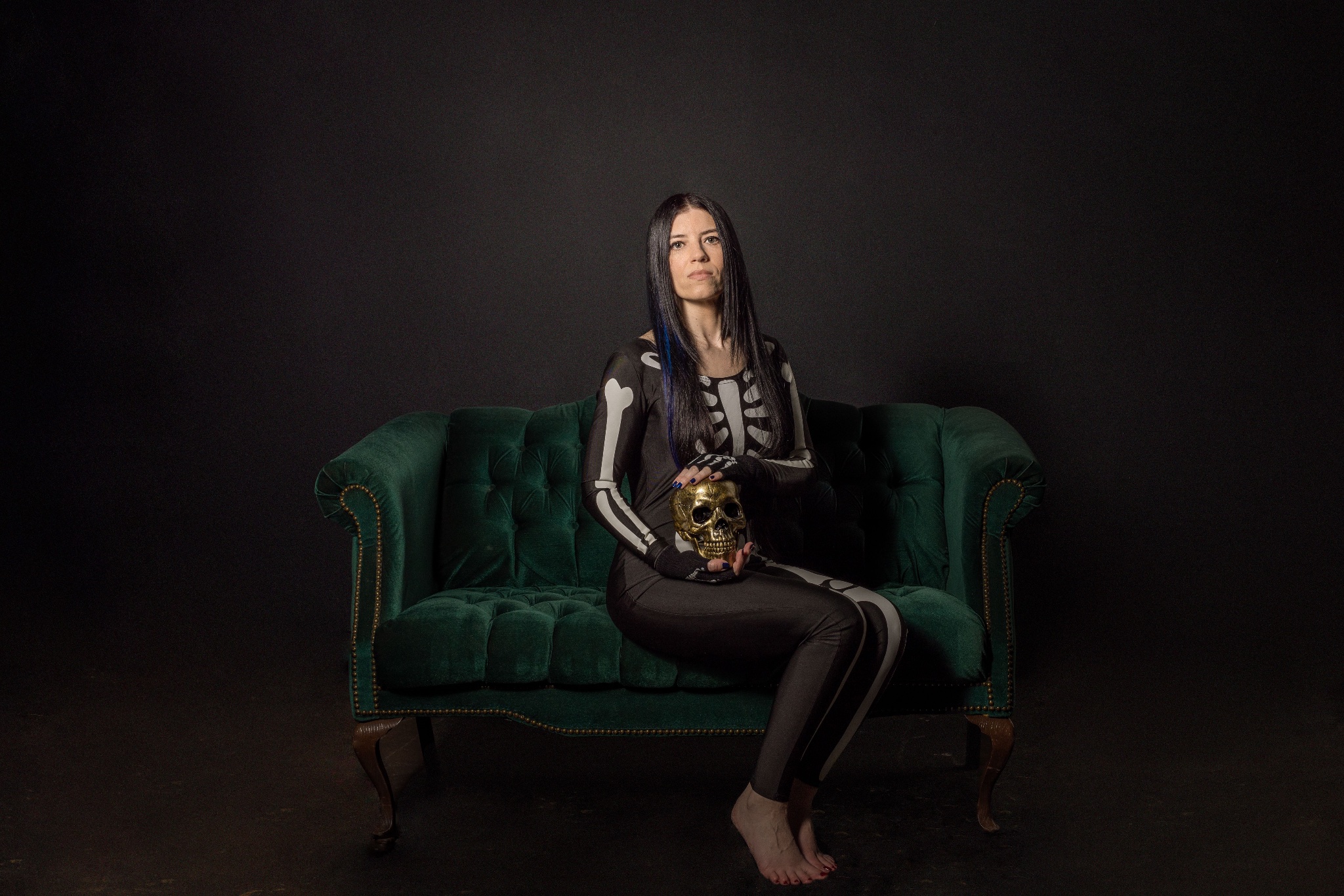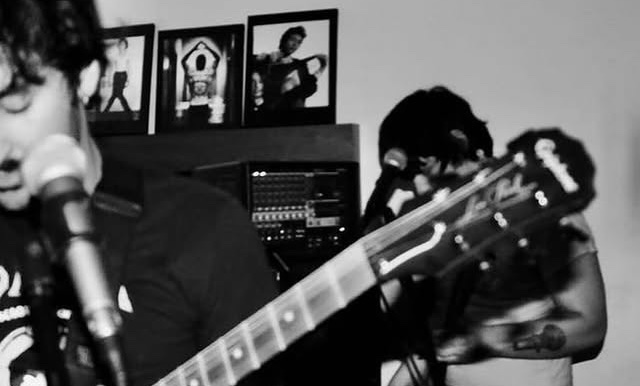Survival Guide - Sound In The Signals Interview
 |
| Mike Carey |
First, thanks for the interview.
Thank you for having me!
You’re set to release your upcoming album ‘deathdreams’ on October 19th. What can you tell us about it so far?
I am SO excited about 'deathdreams'! It's the first material I've ever written completely by myself, which is a huge accomplishment for me. I've been making music for a long time, but primarily as a vocalist. Writing a full album on my own was a daunting goal, and I'm so glad that I not only stuck with it and finished the record, but I LOVE the way it turned out! It's a dream come true. But not a death dream. :) It's going to be pressed into five beautiful vinyl variants (of 100 each), one of them being a mystery to us all! I gave Burlington Record Plant the freedom to choose what that fifth variant will be, and I can't wait to see it!
Can you tell us more about the writing process and the lyrical themes you explored?
My writing process is very slow, especially as a solo songwriter. I'm now writing all the music by myself, which is new for me. Often I will allow the instrument or synth sound to dictate what the song is like -- for example, I may find a fat, buzzy synth sound that I like and I'll mess around with it for a while, and usually some sort of pattern emerges that I like. At that point I would probably record it as a small piece and put it away for later.
The next time I go to work on it, I see how I feel about it and whether I can add to the music. When it's shaped into something resembling an instrumental song, then I'll start formulating lyrics. I have a dedicated notebook where I'll free-write about anything that seems song-worthy to me. When I have an instrumental (or part of one) that I feel good about, I'll figure out which free-write seems to fit best, then work on building melody and lyrics at the same time. Hopefully I laid that out in a way that makes sense!
As for the lyrical themes, the central concept is literal death dreams. Over the last few years, I've had a handful of dreams where I died, and they were very vivid, which isn't common for me. Both "Lady Neptune" and "I'll Picture You" are about these dreams, and there was a third one that I didn't finish in time. The other themes that thread their way through multiple songs are anxiety, manipulation, and societal (or self-inflicted) pressures, plus a good old-fashioned breakup song.
Can you tell us more about writing “Blood Perfume?"
"Blood Perfume" is one of the very first songs I started writing, but it was also the very last one I finished before going into the studio to record. I started it by finding the drum sounds and building the beat. It felt right being at a slowish tempo, and that, combined with the choice of samples, made it seem creepy and dark. So it was fairly easy finding instruments to fill in the music.
It took me a while to find the right subject matter for the song, and I ultimately chose to write it from the perspective of the things/people/constructs that have us under their power. Things that we start to see as god-like and give up part of ourselves for. It can be something as benign as wasting time scrolling for too long (of which I'm often guilty and I really dislike it), or something as tangible as an abusive partner we cling to. Or when someone relies TOO heavily on some outside source to make all their decisions -- the media, religion, government, advertising, etc. In a nutshell, it's about self-diminishing for someone (or something) else.
Bob Hoag (Dear and the Headlights, The Ataris, The Format) produced the album at Flying Blanket Recording. What was this experience like and what did it add to the process?
Recording with Bob was so amazing! I feel extremely fortunate that my label (Double Helix) was able to set me up with him for recording, producing and mixing the album. The experience was very nerve wracking at first, because I was far from home, in the studio by myself showing my demos to a man I'd never worked with or spent time with before -- I felt very vulnerable. I braced myself in case we didn't work well together, because we were past the point of no return!
Also, I've had a few unpleasant experiences with producers in the past, so I was wary of that going in. But I quickly learned there was nothing to worry about -- Bob was extremely respectful of my songs and my abilities as a musician and songwriter, and it's obvious that he's a master at his craft.
He enhanced all of my songs and made them sound so professional, which shouldn't be surprising to me since that's his job, but it seemed a bit like magic to me because he always knew exactly what to do to make everything better and better with each change. There are a few songs that I brought in that were very sparsely written and needed lots of additional instrumentation, and it was so fun and exciting to hear his ideas bring the songs to life!
Can you tell us more about the recording process? What came easiest in the process and what took more time?
We spent a LOT of time on this record, or at least it was a lot to me. That's probably partially because I've never been the only musician in the group -- I wrote everything, so I had to be fully engaged and present for every bit of the recording. Seems obvious, but it was tiring! So much respect to all the engineers and producers out there who spend long days and nights digging deep into every part of every song!
One thing that surprised me was that we used a lot of my actual demo bits in the final songs. I thought all that would be deemed unworthy and re-recorded, but we kept most of it, and oftentimes Bob would either replace the sounds with better ones, or add more layers to make things more full. He recorded a lot of live drums over top of my programmed drums as well, which I feel brought so much quality to the album. The drums probably took the longest, because Bob is a skilled drummer and took the time to make the digital and analog drums sit perfectly together.
The quickest thing was the lead vocals, or at least it seemed to be. That's probably because I was having a lot of fun recording them and I didn't want it to end. Every time we finished tracking vocals for a song, part of me was sad that it was over.
What do you hope listeners take away from the album? What did you take away from the process of creating it?
What a tough question! Obviously I created this album for people to listen to, but mainly I did it to prove to myself that I *could* do it and that I am truly a musician. There's a complex that can come from being "just a singer" and it's definitely caused me to debate internally whether I'm a musician or not. It may sound a bit ridiculous, but what I took away from the process is that yes, I am a musician, and I can write songs in any way I want. I also took away that, even though Survival Guide is a solo project, that doesn't mean I have to do everything myself. A lot of people helped and contributed in different forms along the way.
As for listeners, it would be great if they knew all this about my experience and it gave the songs extra gravity. But for all listeners, I mainly just hope that they connect with the lyrics and/or music in a way that's meaningful to them. That's all I can ever hope for once the music is out in the world!
At this point in your career, what's your favorite thing you've achieved as an artist so far? What do you still hope to accomplish?
My biggest achievement has been 'deathdreams'! Looking back, I've done some grandiose things through music, like touring all over the world and performing to some massive crowds, and I love those memories. But creating this album has been the most difficult thing I've ever done as a musician, so I'm extremely proud and relieved that it's become a reality. It would have been so much easier to quit music and never write or record this album. By the same token, I don't take all of the other accomplishments for granted. It certainly took a lot of hard work and dedication to build an international fanbase with my previous band. I hope to accomplish that again with Survival Guide. I also want to sing on a Bond theme song... I'm kinda hoping the next one will be called "Sharpshooter"!
Thanks for taking the time to answer the questions. Is there anything else that you'd like to add?
Yes -- I want to mention that I'm also attempting to create a little recipe book of 'deathdreams' cocktails (and mocktails) -- one for each song on the album as a companion piece. At this point, I've got five down and six to go! I'm not totally sure how this will materialize yet, but most likely it will be available digitally. Thanks again for the interview!
Follow Survival Guide:
Follow Sound In The Signals:




No comments: